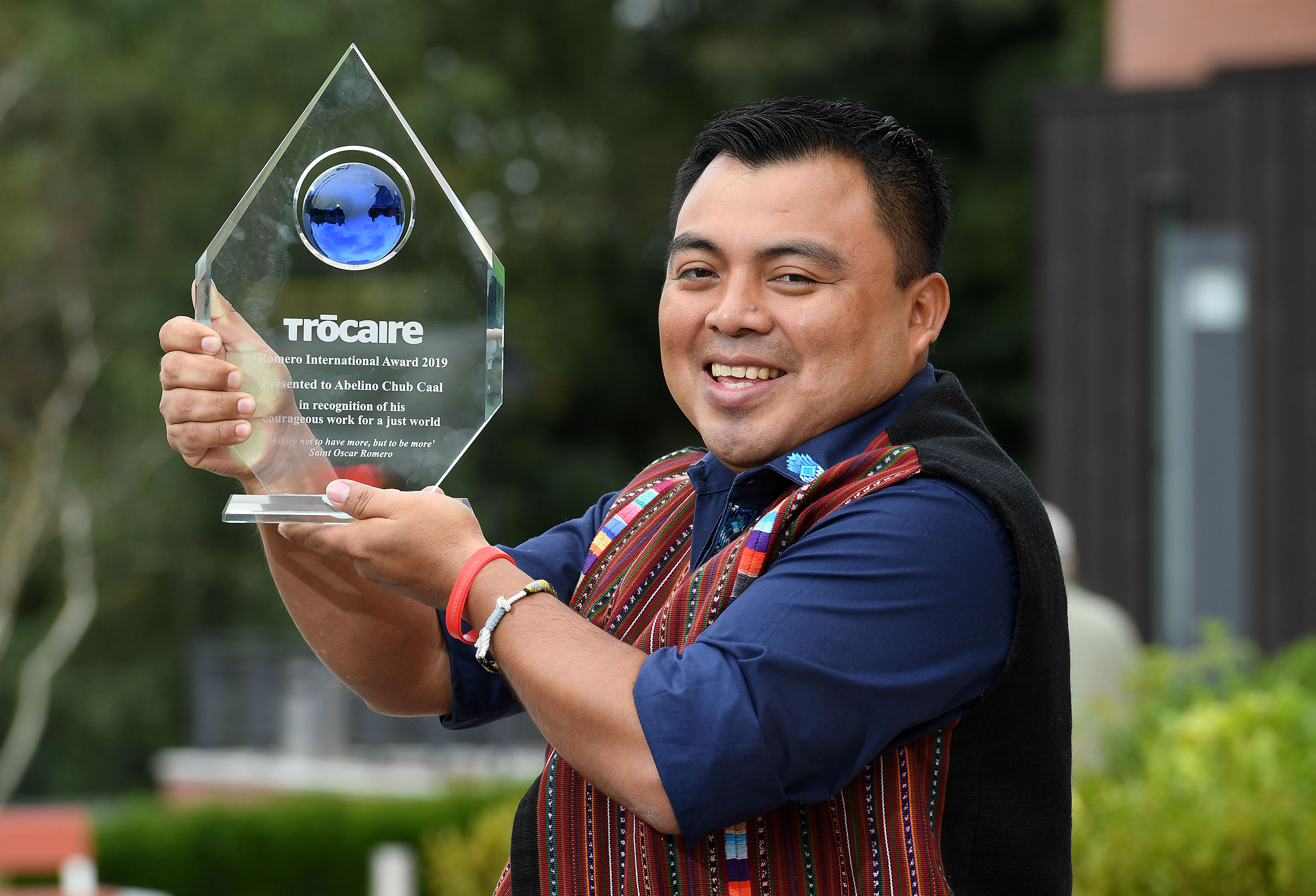THE world is facing an ecological disaster. Natural resources are relentlessly extracted and natural habitats destroyed in the name of profit, and there are few who feel the harsh realities of this material greed more acutely than the indigenous communities of Guatemala, who are routinely murdered, ‘disappeared’ and brutalised by corporations intent on driving them from their ancestral homes.
In a country where the government conspires with big corporations, state apparatus is routinely used to clear indigenous lands for mining operations, plantations, and dam-building. For the people who live there this means bribery, rape, death and in the case of human rights activists and others, like Abeline Chub Caal, it often means imprisonment.
In plush surrounds of Queen’s University’s Riddell Hall in Stranmillis, where Abelino received Trócaire’s Romero International Award, the violence of Guatemala could hardly feel more remote, that is until you hear him speak.
Given that Abelino was unjustly imprisoned for speaking out, there are probably few who can speak with more authority on the situation in Guatemala, where the burning of indigenous people’s crops, and homes is a part of everyday life.
In April, the 35-year-old was released after two-years and currently acts as a mediator between those who are having their rights abused and an intransigent government.
While our interview was conducted through a translator, it was apparent that Abelino, through his direct and matter-of-fact style of speech, was exactly the kind of voice that oppressive governments and wealthy elites fear. Our first topic of conversation was, of course, the award that was given to him for his human rights activism, however, Q’eqchi leader wasted no time in explaining the violent realities of indigenous people in Guatemala.
“I am here to receive the award, and it’s great that they have selected me as the recipient,” he said.
“Maybe I’m not the person who should receive it, but I’m happy to be here. I am very fulfilled with all the work that I’ve done with my brothers and sisters, campesino and indigenous people in Guatemala, working for their human rights and their rights to land. I believe that is my calling in this life; to work for the poor and the dispossessed in our country.
“In Guatemala it is almost as if the indigenous peoples don’t have a right to exist, they are under constant persecution from the state.
“Our state is extremely racist and imposes a model of development that is extremely damaging for the environment, and it includes the criminalisation of whole communities and the detention of human rights defenders. For instance, where I am working right now the government has declared a state of siege against the community with the sole purpose of controlling the human rights defenders who are there and the community who is fighting for their rights. The idea is to silence the voice of the community.
“The indigenous communities in my country haven’t been respected. They have lost their lands, they are facing eviction notices, and leaders are facing arrest warrants. The government doesn’t care – their only aim is to maintain the privilege of the dominant class and the businesses.”
In the face of brutal repression, communities in Guatemala are fighting back to protect their way of life and the environment, making what use of international human rights law that they can, but going head to head with a despotic regime is an immense struggle.
“We use a lot of international legal instruments such as the ILO (International Labour Organisation) Convention 169, which gives indigenous peoples the right to a full prior and informed consultation any time that a company wants to come into their territory and operate there,” Abelino explained.
“We are resisting, but it is a struggle. Unfortunately neither the government nor the corporations respect the results of those consultations because they don’t see them as legally binding.
“In our Mayan Q’Echii mother nature is life, but for the economic powers land and nature are just commerce. This is our way of seeing the world and we’re going to continue defending our right to land even though the struggle is difficult and they are repressing our struggle.”
Across the globe indigenous communities are facing a threat from capitalist corporations. A recent example that made headlines were those in the Amazon, who are being burned out of their lands to make way for large-scale cattle farming. Asked about the nature of the corporations and companies behind the destruction throughout the world, Abelino said: “No one would object to a company or transnational corporation if they intend to respect rights and respect life,” he said.
“What we have seen is that the actions of these companies are extremely damaging to the environment and to communities and we will keep opposing them as long as they are ransacking our natural resources.
“It’s completely inhumane when they steal the land, exploit the land, kill the people, and rape the women. When we see these actions, we see that it is a monster we are dealing with. These companies are monsters.”
Indigenous peoples living under threat

RECOGNITION: Abeline Chub Caal with his Trócaire award


